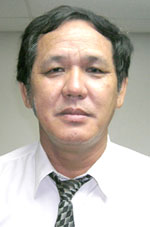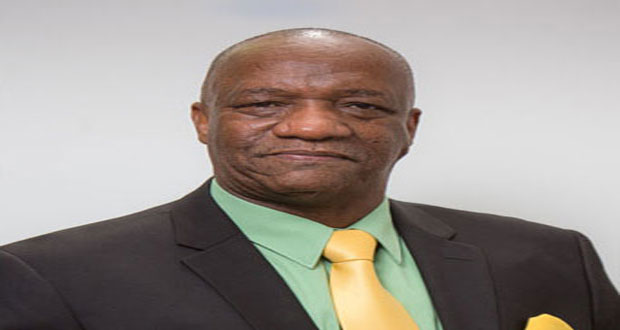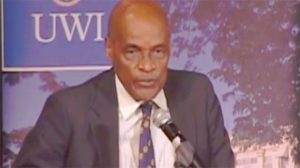Harmon confirms… Gov’t to appeal third term ruling by Chief Justice
FOLLOWING a ruling by Acting Chief Justice Ian Chang that the barring of a third-term presidential run was unconstitutional, the Government of Guyana has signalled its intention to appeal the matter, taking it to its legal limits for a reversal of the decision. This was confirmed yesterday by Minister of State Joseph Harmon, who revealed during a telephone interview, that Attorney General (AG) and Minister of Legal Affairs, Basil Williams had assured him on Thursday last, in the National Assembly, that there will be an appeal.
The presidential term limit which was provided for in the Constitution, through the constitutional amendment made in the 2001 Herdmanston Constitutional Reform process, was quashed byacting Chief Justice Ian Chang on Thursday last, after it was challenged by private citizen, Cedric Richardson, earlier in the year.
Richardson questioned the way in which the Constitution was amended, which was through a two/thirds majority in the National Assembly, and contended that this was illegal. He offered rather, that such a decision should be made by way of a referendum.
In his ruling on Thursday, Chang stated , “The alteration or replacement of the original 1980 preamble was effected by Act 6 of 2001 which did not receive the approval of Guyanese citizens by way of referendum; yet it declares ‘as citizens of Guyana, we adopt these fundamental laws and make provisions for their amendments to reflect changes in our society.’”
“In so far as it seeks to trench on and to dilute the pre-existing democratic rights of the electorate to elect as president a person of their own choice, needed a referendum and is invalid and without legal effect for reason of non compliance,” the ruling read.
Additionally, the Chief Justice (ag) noted that Article 9 of Guyana’s Constitution guarantees the Guyanese people sovereignty “through their representatives and the democratic organs established by or under this Constitution.”
“The purported alteration of Article 90 by the Act No. 17 of 2001, in substance and effect, undoubtedly diminishes the democratic rights of the electorate in electing a person of their own choice as President… The court therefore holds that Act No. 17 of 2001, in so far as it seeks to trench on and dilute the pre-existing democratic rights of the electorate to elect as President, a person of their choice,” Chang said in support of his ruling.
He further argued that the term limits “in substance and effect, undoubtedly diminishes the democratic right of the electorate in electing a person of their own choice as president by excluding from presidential candidature.”
Inheriting the role as a defendant is Attorney General, Basil Williams, along with Minister of Governance, Raphael Trotman, who had been enlisted as one of the two defendants when the writ was filed in the High Court.
Offering a comment on Thursday, Trotman disclosed that the ruling will more than likely be the subject of an appeal, since, “something like this which goes to the heart of our Constitution has to be tested by the highest court which is the CCJ (Caribbean Court of Justice).”
According to the Governance Minister, “What we have to look at is the fact that this decision has implications for all of the raft of reforms that comes under the Herdmanston reform process…all of them may very well fall under the hammer…you may be thinking that you are going at one provision, but really and truly, this ruling, if allowed to stand, would really set apart and wash away all of the reforms that were put in place during the Herdmanston reform process…it cuts into and cuts across the full gamut of reforms.”
Meanwhile, Former Guyanese Judge at the Caribbean Court of Justice (CCJ), Professor Justice Duke Pollard, weighed in on the issue, offering in a letter to the press that, “The judgment is arguably tendentious, occasionally pleonastic, bereft of sustained rationality, strangely and curiously, not to mention inexcusably, eschewed the application of the required rule of statutory interpretation in construing the provisions of Article 1 of the Guyana Constitution, given the concatenation of genus-describing attributes employed therein.”
“In my respectful submission, therefore, the determination of our learned Chief Justice in Cedric Richardson v Attorney General and Raphael Trotman is irretrievably flawed and is likely to be overturned on appeal, given among other deficiencies, an arguably perception of bias by reference to the relevant provisions of the Bangalore Draft Principles and the Latimer House Guidelines on judicial conduct” Justice Pollard said in his letter.
He further expressed that in the ultimate analysis, our Constitution, the supreme law, relieved Parliament of the need to secure approval of Act No.17 of 2001 by referendum.
“And where the Constitution has been expressed to be the supreme law as in Guyana, and has pronounced clearly, definitively and conclusively on an issue, as in the Proviso of Article 164(2) of the Guyana Constitution, no judge should dare to tread contrarily. lest judicial determinations be unwittingly construed as trumping constitutional supremacy” the Professor submitted.
By Ravin Singh



